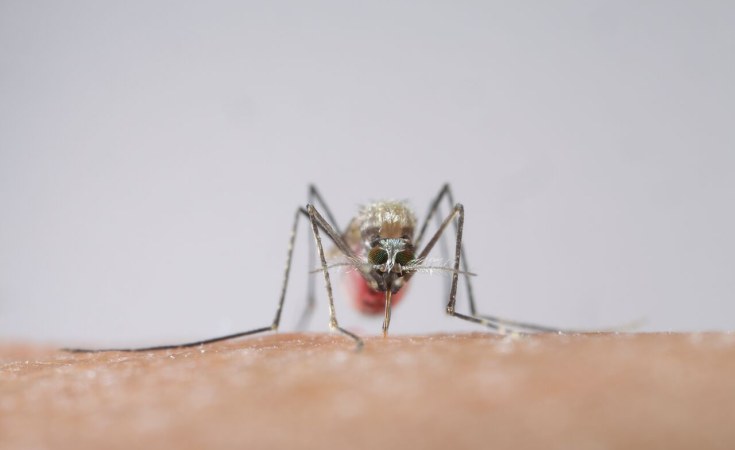Until three years ago nobody had developed a vaccine against any parasitic disease. Now there are two against malaria: the RTS,S and the R21 vaccines.
Adrian Hill, director of the Jenner Institute at the University of Oxford and chief investigator for the R21 vaccine, tells Nadine Dreyer why he thinks this is a great era for malaria control.
What makes malaria such a difficult disease to beat?
Malaria has been around for 30 million years. Human beings have not.
Our hominoid predecessors were being infected by malaria parasites tens of millions of years ago, so these parasites had a lot of practice at clever tricks to escape immune systems long before we came along. Homo sapiens first evolved in Africa about 315,000 years ago.
Malaria is not a virus and nor is it a bacterium. It's a protozoan parasite, thousands of times larger than a typical virus. A good comparison is how many genes it has. COVID-19 has about a dozen, malaria has about 5,000.
Additionally, the malaria parasite goes through four life cycle stages. This is as complex as it gets with infectious pathogens.
Medical researchers have been trying to make malaria vaccines for over 100 years. In Oxford it's taken us 30 years of research.
How does the R21/Matrix-M vaccine work?
The four malaria life cycles are all hugely different, with different antigens expressed. An antigen is any substance that causes the body to make an immune response against that substance.
We targeted the sporozoites, which is the form that the mosquito inoculates into your skin. We were working to trap them before they could get to the liver and then carry on their life cycle by multiplying furiously.
Each mosquito injects a small number of sporozoites, perhaps 20, into the skin. If you clear those 20, you've won. If one gets through, you've lost. The bad news is you've only got minutes.
So you need extraordinarily high levels of antibodies that the parasite hasn't seen before and hasn't learnt to evolve against. Technologically it's like having to design a car that's 10 times faster than anything else on the road.
Luckily, there are no symptoms of malaria at that stage.
Read more: Two new malaria vaccines are being rolled out across Africa: how they work and what they promise
A child dies every minute from malaria in Africa. Why are children more susceptible than adults?
Children under five years old account for about 80% of all malaria deaths in Africa. The age you're most likely to die of malaria in Africa is when you are one year old.
For the first six months you are protected largely by your mother's immunity and the antibodies she transfers during pregnancy.
If you survive to age two or three, and you've had a few episodes of malaria and you are still alive, you've got a bit of immunity. This improves over time.
Some children get up to eight episodes in three or four months. They get quite unwell with the first, and three weeks later they're having a second bout and so on.
Natural immunity doesn't work until you've had a lot of different infections and that's why adults are generally protected against malaria and don't become very unwell.
Without malaria, children would be healthier in general -- the disease makes you susceptible to other infections.
What about the pace of vaccine rollouts?
We've been disappointed that it's taken more than six months to roll out the R21 vaccine since it was approved in October last year. There are millions of doses of R21 sitting in a fridge in India.
There are a lot of organisations and processes involved in standard deployment that don't seem necessary.
Compare that to a COVID-19 vaccine from Oxford and AstraZeneca that was approved on New Year's Eve 2020 and rolled out in several countries the very next week.
In the same year malaria killed more people in Africa than COVID-19 did.
The first malaria vaccine, the RTS,S, has already been given to millions of children in a large safety trial and the uptake has been really high, so large coverage can be achieved in Africa.
How big a role will vaccines have in the fight to eradicate malaria?
We really think we have an opportunity now to make a big impact.
Nobody is quite sure how many of the older tools such as insecticides and bed nets we need to carry on with. The advice is to keep them all.
But mosquitoes are building resistance to insecticides. Anti-malaria medication only lasts for days and parasites are building up resistance against these drugs as well.
There are about 40 million children born every year in malaria areas in Africa who would benefit from a vaccine. The R21/Matrix-M has been designed to be manufactured at scale. The Serum Institute of India, our manufacturing and commercial partner, can produce hundreds of millions of doses each year.
Another real advantage is its low cost. At US$3.90 a dose the R21/Matrix-M appears to be the most effective single intervention we can deploy against malaria
Worldwide there is US$5 billion currently allocated to fight malaria each year.
We're optimistic that if this money is spent sensibly we can make a big difference. Buying 200 million doses of the R21/Matrix-M vaccine would cost US$800 million.
Being in the field I'm aware of other vaccines coming along. Some are targeting the blood stage and others the mosquito stage of malaria, which is very exciting. This looks like a great era for malaria control.
More than 600,000 people die of malaria each year. With low-cost, very effective vaccines being deployed we should be able to get this down to 200,000 or less by the end of this decade.
Then the endgame will be malaria eradication worldwide, which really should happen in the 2030s.
Adrian Hill, Director of the Jenner Institute, University of Oxford


